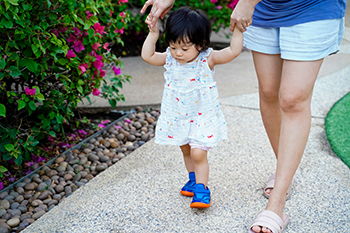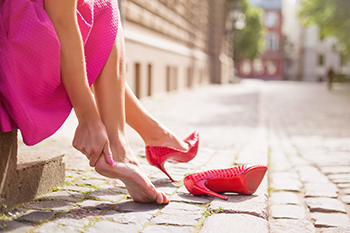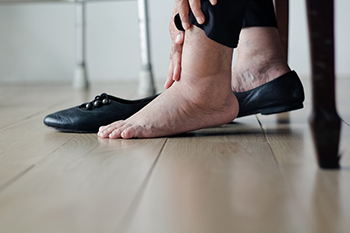February 2023
Choosing Walking Shoes for Your Baby

Until your baby begins to walk, it is thought by experts not to bother with shoes. Babies learn how to navigate, picking up information on balance and stability, while barefoot. It’s important to note that a baby’s feet develop over a period of time, and finding shoes that fit them is paramount to this process. The wise parent is one who frequently measures their baby’s feet over the first few years and replaces shoes as needed. A properly fitting shoe should have about half an inch between the toe and the tip of the shoe. It should also have enough room in the toe box for your toddler to wiggle their feet. Watch for a loose or slipping heel when they walk and any red marks on their feet when the shoes are removed. Lightweight materials such as leather or mesh are thought to be best for a baby’s development. Velcro straps and washability are also positive features. For more information on the best shoes for your toddler, it is a good idea to consult a podiatrist.
Making sure that your children maintain good foot health is very important as they grow. If you have any questions, contact Dr. Scott Shrem of Garden State Foot & Ankle Center. Our doctor can provide the care you need to keep you pain-free and on your feet.
Keeping Children's Feet Healthy
Having healthy feet during childhood can help prevent medical problems later in life, namely in the back and legs. As children grow, their feet require different types of care. Here are some things to consider...
Although babies do not walk yet, it is still very important to take care of their feet.
Avoid putting tight shoes or socks on his or her feet.
Allow the baby to stretch and kick his or her feet to feel comfortable.
As a toddler, kids are now on the move and begin to develop differently. At this age, toddlers are getting a feel for walking, so don’t be alarmed if your toddler is unsteady or ‘walks funny’.
As your child gets older, it is important to teach them how to take care of their feet.
Show them proper hygiene to prevent infections such as fungus.
Be watchful for any pain or injury.
Have all injuries checked by a doctor as soon as possible.
Comfortable, protective shoes should always be worn, especially at play.
If you have any questions please feel free to contact our office located in Hazlet, NJ . We offer the newest diagnostic and treatment technologies for all your foot and ankle needs.
What Is High Heel Syndrome?

Although it might not seem immediately obvious, the kinds of shoes that you wear can have a discernible impact on the health of your feet. For example, if you wear non-supportive, flimsy footwear, this can spell trouble for the strength and resilience of your feet. High heels are one such kind of potentially detrimental footwear. The impact that high heels can have on your feet and body is sometimes referred to as high heel syndrome. As a result of overuse of high heels, an individual might experience anatomical changes in their legs. Typically these individuals will have Achilles tendons that are more stiff. When an individual is experiencing high heel syndrome, they may benefit significantly from stretching exercises that target the calves. If you are someone who wears high heels frequently, consider contacting a podiatrist for more information and support.
High heels have a history of causing foot and ankle problems. If you have any concerns about your feet or ankles, contact Dr. Scott Shrem from Garden State Foot & Ankle Center. Our doctor can provide the care you need to keep you pain-free and on your feet.
Effects of High Heels on the Feet
High heels are popular shoes among women because of their many styles and societal appeal. Despite this, high heels can still cause many health problems if worn too frequently.
Which Parts of My Body Will Be Affected by High Heels?
- Ankle Joints
- Achilles Tendon – May shorten and stiffen with prolonged wear
- Balls of the Feet
- Knees – Heels cause the knees to bend constantly, creating stress on them
- Back – They decrease the spine’s ability to absorb shock, which may lead to back pain. The vertebrae of the lower back may compress.
What Kinds of Foot Problems Can Develop from Wearing High Heels?
- Corns
- Calluses
- Hammertoe
- Bunions
- Morton’s Neuroma
- Plantar Fasciitis
How Can I Still Wear High Heels and Maintain Foot Health?
If you want to wear high heeled shoes, make sure that you are not wearing them every day, as this will help prevent long term physical problems. Try wearing thicker heels as opposed to stilettos to distribute weight more evenly across the feet. Always make sure you are wearing the proper shoes for the right occasion, such as sneakers for exercising. If you walk to work, try carrying your heels with you and changing into them once you arrive at work. Adding inserts to your heels can help cushion your feet and absorb shock. Full foot inserts or metatarsal pads are available.
If you have any questions please feel free to contact our office located in Hazlet, NJ . We offer the newest diagnostic and treatment technologies for all your foot and ankle needs.
Heel Pain Can Be Treated!
Finding the Right Shoes for Swollen Feet

Many people deal with the discomfort of swollen feet, or edema, on a daily basis. It is typical among diabetics, pregnant women, and people with kidney or liver ailments. Certain medications, especially those connected to heart or circulation issues, also can contribute to edema. Swelling is caused by a buildup of fluid in the feet, ankles, and legs. It can be the result of sitting for too long on a flight, and wearing compression stockings is often recommended. Reducing salt intake is another way to counteract the effects of swollen feet. Wearing shoes that are specifically designed for people with edema is also a good idea. Among the qualities to look for in this type of footwear is extra width in shoes made from flexible, but durable, materials. Shoe inserts may also help alleviate pain when standing or walking. Velcro fasteners are desirable so when the feet are particularly bothersome or extra swollen, the width of the shoe can be adjusted. For more help with finding out why your feet are swelling and how to deal with it, please consult a podiatrist.
Swollen feet can be a sign of an underlying condition. If you have any concerns, contact Dr. Scott Shrem of Garden State Foot & Ankle Center. Our doctor can provide the care you need to keep you pain-free and on your feet.
Swollen feet are a common ailment among pregnant women and people who stand or sit for extended periods. Aging may increase the possibility of swollen feet and patients who are obese often notice when their feet are swelling too. There may be medical reasons why swollen feet occur:
- Phlebitis - A condition that causes the veins to become inflamed and can also cause leg pain.
- Liver disease - This may lead to low blood levels of albumin which is a protein. This can cause fluid in the blood to pass into the tissues and several areas of the body can become swollen.
- Heart failure - When the heart doesn’t pump properly the blood that is normally pumped back to the heart can pool in the veins of the legs causing swollen feet.
- Kidney disease - One of the main functions of the kidneys is releasing excess fluid in the body. This type of condition can make it difficult for the kidneys to function properly, and as a result the feet may become swollen.
- Deep-vein thrombosis (DVT)- This is a serious condition where blood clots form in the veins of the legs. They can block the return of blood from the legs to the heart which may cause the feet to swell. It is important to be treated by a podiatrist if this condition is present.
Swollen feet can also be caused by bone and tendon conditions, including fractures, arthritis, and tendinitis. Additionally, there may be skin and toenail conditions and an infection may cause the feet to swell. Patients who take medicine to treat high blood pressure may be prone to getting swollen feet.
Many patients elevate their feet to help relieve the swelling and this is generally a temporary remedy. When a podiatrist is consulted the reason behind the swelling can be uncovered and subsequently treated.
If you have any questions please feel free to contact our office located in Hazlet, NJ . We offer the newest diagnostic tools and technology to treat your foot and ankle needs.
Mandatory Education to Become a Podiatrist

A podiatrist’s job is to treat conditions of the feet and ankles. There are several years of mandatory school that must be obtained before the initials DPM can follow a students name. This is the abbreviation for Doctor of Podiatric Medicine, and the education begins with earning a bachelor’s degree. The courses that are taken will include physiology, anatomy, and patient care instruction. This is followed by completing a podiatric medicine program, which generally takes approximately four years. Attending a podiatric residency is the next step to take, which is done in a hospital or clinic. Some of the foot conditions that podiatrists treat are bunions, hammertoe, and athlete’s foot. Diabetic foot ulcers are treated by a podiatrist, in addition to painful conditions such as plantar fasciitis and heel spurs. If you are interested in pursuing a career in podiatry, it is suggested that you speak to a podiatrist who can help you to determine if this is the right path for you.
If you are dealing with pain in your feet and ankles, you may want to seek help from a podiatrist. Feel free to contact Dr. Scott Shrem from Garden State Foot & Ankle Center. Our doctor can provide the care you need to keep you pain-free and on your feet.
What Is a Podiatrist?
A podiatrist is a doctor of podiatric medicine who diagnoses and treats conditions of the foot, ankle, and related structures of the leg. Your podiatrist may specialize in a certain field such as sports medicine, wound care, pediatrics, and diabetic care. Podiatrists have the ability to become board certified through training, clinical experience, and then taking an exam.
What Do Podiatrists Do?
On a daily basis, a podiatrist may perform the following activities:
- Diagnose foot ailments such as ulcers, tumors, fractures, etc.
- Use innovative methods to treat conditions
- Use corrective orthotics, casts, and strappings to correct deformities
- Correct walking patterns and balance
- Provide individual consultations to patients
It is very important that you take care of your feet. It’s easy to take having healthy feet for granted, however foot problems tend to be among the most common health conditions. Podiatrists can help diagnose and treat a variety of feet related conditions, so it is crucial that you visit one if you need assistance.
If you have any questions please feel free to contact our office located in Hazlet, NJ . We offer the newest diagnostic and treatment technologies for all your foot and ankle needs.








